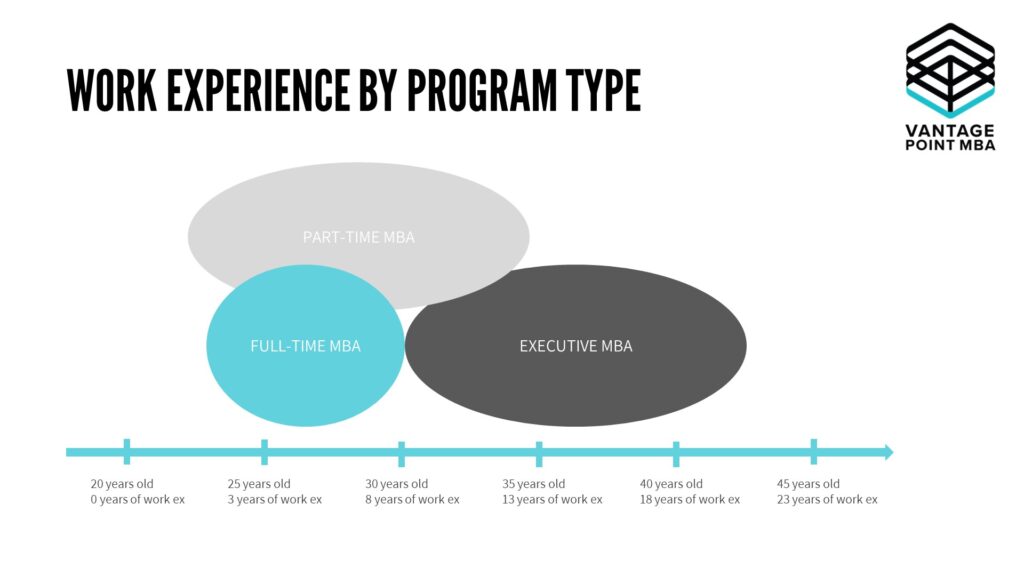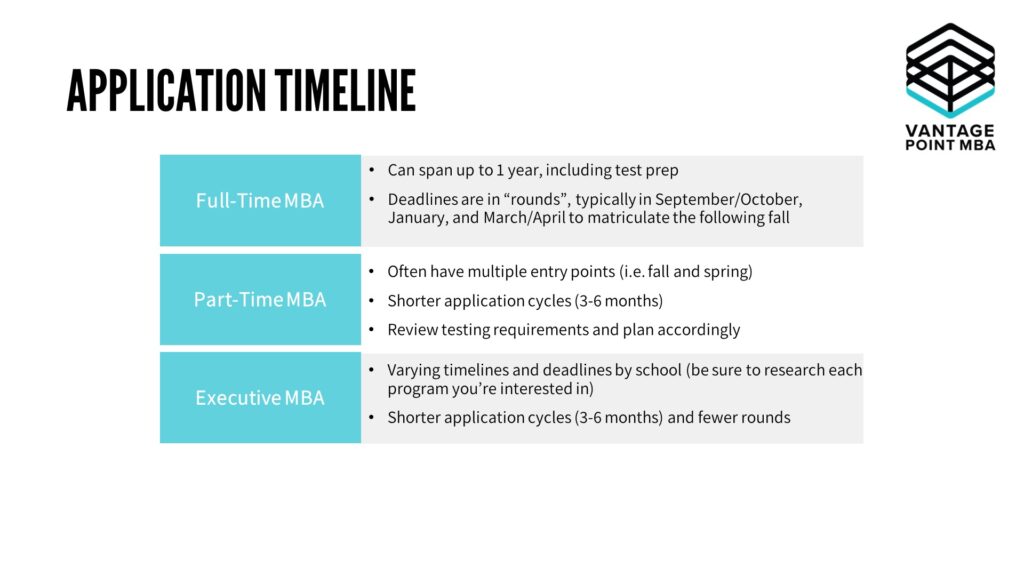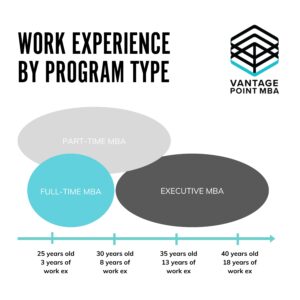Is an MBA Worth It for Me? The Top Three Things to Consider

Originally published on November 23, 2023. Updated on November 14, 2024.
If you’ve begun to consider whether to apply to business school (maybe you even read our last article, ‘Should I Get an MBA? Stuff They Tell You and Stuff They Don’t‘), you likely have a multitude of questions swirling in your mind. Where should I apply? Will I get into a program I’m excited about? And, perhaps most importantly, is going to business school and getting an MBA worth it for me?
If you plan to attend a full-time program, stepping away from your current job for a post-MBA goal that you think sounds appealing can be daunting. To help structure your decision about whether an MBA is worth it, here are the top three factors we recommend you consider.
#1 – Cost
While an MBA is often an investment with a strong ROI, it’s essential to understand the total costs involved and plan how you will cover them.
Tuition and Expenses
The costs associated with an MBA vary widely. For a top full-time MBA program, you’re looking at $250,000 or more over two years. Part-time MBA programs tend to cost around $150,000, while executive programs can be around $200,000. Beyond tuition, you’ll also want to consider expenses like living costs, books, and supplies.
Travel and Extras
Beyond tuition, you’ll want to think about some of the “extras” that come with business school. Travel expenses can add up, particularly if you’re interested in extracurricular trips or experiences with classmates. Some travel is optional—like ski trips or European summer tours with new friends. But, be realistic about FOMO (fear of missing out); these opportunities are hard to pass up, especially in a close-knit campus environment.
Other travel may be a required part of the curriculum. Many MBA programs offer or require global coursework, which involves immersive travel to study regions around the world. Part-time and executive programs may also require travel if the school isn’t in your city, including lodging costs if you attend on-campus sessions.
Opportunity Cost
For full-time MBA students, there’s an extra financial consideration: opportunity cost. Stepping away from your job for two years means forgoing income during that time. This cost varies, but it’s essential to weigh this lost income as part of your financial plan. Scholarships and financial aid can help offset these costs; in fact, you may even be able to negotiate some scholarship offers. For tips on how to do this, see our article on MBA Scholarships: Can You Negotiate Them, and If So, How?.
#2 – Timing
Timing is an important factor when asking, Is an MBA worth it for me? Timing actually refers to two aspects: first, how much work experience you have, and second, how far in advance you’re preparing to apply.
Career Stage
Consider how much work experience you have. MBA programs target students with different levels of experience. Full-time MBAs often attract younger students early in their careers. Since these students have a lower opportunity cost in leaving the workforce, it’s easier for them to step away. Younger students also often benefit more from an MBA, using it to grow within or pivot to a new career.
If you’re further along in your career, part-time or executive programs may be a better fit. These programs allow you to keep working while you study and are designed for mid-career professionals.
Thinking about which MBA path aligns with your career stage? Reach out to us for tailored advice to find the right fit for your goals.

Application Preparation
The timeline to apply also matters. For top full-time programs, it’s best to start preparing at least a year before you plan to enroll. Many applicants begin by studying for the GMAT or GRE, visiting campuses, and networking with current students or alumni. Applications for full-time MBAs are generally due in January or February, with classes starting in the fall.
Part-time and executive MBAs have more flexible timelines, often with shorter lead times between application and enrollment. Understanding these timelines can help you decide which type of MBA program is worth it for you and whether an MBA is right for your circumstances.

#3 – Goals
Your career goals are perhaps the most critical factor when considering, Is an MBA worth it? We can’t stress this enough: define your personal and professional goals before committing to an MBA program.
Importance of Clear Goals
Having clear, ambitious, yet realistic goals is essential. These goals not only give you direction, but they also strengthen your application. Admissions committees seek candidates who have a well-defined purpose for pursuing an MBA. Knowing what you want to achieve shows the admissions team that you’re likely to make the most of the MBA experience.
Maximizing Your MBA Experience
Arriving on campus with clear goals also helps you navigate the MBA experience effectively. Full-time MBA programs move quickly. To make the most of it, you need a clear sense of what skills you want to build and which people you want to network with. Without this focus, you risk missing out on important career opportunities, including internships and job offers.
For tips on setting strong career goals that resonate with admissions, read our guide on Crafting Your MBA Career Goals.
Reasons to Pause and Reflect
If you’re considering an MBA to “take a break” or escape a job you dislike, it’s worth pausing to reflect. The same goes if you’re applying to satisfy someone else’s expectations, like those of a parent, partner, or boss. An MBA is a substantial investment of time, money, and energy, and it’s best pursued for reasons that align with your own goals.
Valid Reasons for Pursuing an MBA
Some ‘good’ reasons for pursuing an MBA often include the desire to pivot into a career that feels more personally meaningful. Many applicants enjoy the path they’re on but want to accelerate their trajectory or shift from ‘doing’ to ‘leading.’ Others may dream of starting their own business one day. Each of these objectives can point to a ‘yes’ when considering whether going to business school for an MBA is worth it. These goals can also help determine the type of program that best suits you—such as a part-time or executive MBA for those looking to accelerate within their current career path.
If you think your answer is ‘yes’ to the question, ‘is an MBA is worth it for me?’ and are ready to apply, let’s chat! Click here to request an initial consultation.
Originally published on November 23, 2023. Updated on November 14, 2024.
If you’ve begun to consider whether to apply to business school (maybe you even read our last article, ‘Should I Get an MBA? Stuff They Tell You and Stuff They Don’t‘), you likely have a multitude of questions swirling in your mind. Where should I apply? Will I get into a program I’m excited about? And, perhaps most importantly, is going to business school and getting an MBA worth it for me?
If you plan to attend a full-time program, stepping away from your current job for a post-MBA goal that you think sounds appealing can be daunting. To help structure your decision about whether an MBA is worth it, here are the top three factors we recommend you consider.
#1 – Cost
While an MBA is often an investment with a strong ROI, it’s essential to understand the total costs involved and plan how you will cover them.
Tuition and Expenses
The costs associated with an MBA vary widely. For a top full-time MBA program, you’re looking at $250,000 or more over two years. Part-time MBA programs tend to cost around $150,000, while executive programs can be around $200,000. Beyond tuition, you’ll also want to consider expenses like living costs, books, and supplies.
Travel and Extras
Beyond tuition, you’ll want to think about some of the “extras” that come with business school. Travel expenses can add up, particularly if you’re interested in extracurricular trips or experiences with classmates. Some travel is optional—like ski trips or European summer tours with new friends. But, be realistic about FOMO (fear of missing out); these opportunities are hard to pass up, especially in a close-knit campus environment.
Other travel may be a required part of the curriculum. Many MBA programs offer or require global coursework, which involves immersive travel to study regions around the world. Part-time and executive programs may also require travel if the school isn’t in your city, including lodging costs if you attend on-campus sessions.
Opportunity Cost
For full-time MBA students, there’s an extra financial consideration: opportunity cost. Stepping away from your job for two years means forgoing income during that time. This cost varies, but it’s essential to weigh this lost income as part of your financial plan. Scholarships and financial aid can help offset these costs; in fact, you may even be able to negotiate some scholarship offers. For tips on how to do this, see our article on MBA Scholarships: Can You Negotiate Them, and If So, How?.
#2 – Timing
Timing is an important factor when asking, Is an MBA worth it for me? Timing actually refers to two aspects: first, how much work experience you have, and second, how far in advance you’re preparing to apply.
Career Stage
Consider how much work experience you have. MBA programs target students with different levels of experience. Full-time MBAs often attract younger students early in their careers. Since these students have a lower opportunity cost in leaving the workforce, it’s easier for them to step away. Younger students also often benefit more from an MBA, using it to grow within or pivot to a new career.
If you’re further along in your career, part-time or executive programs may be a better fit. These programs allow you to keep working while you study and are designed for mid-career professionals.
Thinking about which MBA path aligns with your career stage? Reach out to us for tailored advice to find the right fit for your goals.

Application Preparation
The timeline to apply also matters. For top full-time programs, it’s best to start preparing at least a year before you plan to enroll. Many applicants begin by studying for the GMAT or GRE, visiting campuses, and networking with current students or alumni. Applications for full-time MBAs are generally due in January or February, with classes starting in the fall.
Part-time and executive MBAs have more flexible timelines, often with shorter lead times between application and enrollment. Understanding these timelines can help you decide which type of MBA program is worth it for you and whether an MBA is right for your circumstances.

#3 – Goals
Your career goals are perhaps the most critical factor when considering, Is an MBA worth it? We can’t stress this enough: define your personal and professional goals before committing to an MBA program.
Importance of Clear Goals
Having clear, ambitious, yet realistic goals is essential. These goals not only give you direction, but they also strengthen your application. Admissions committees seek candidates who have a well-defined purpose for pursuing an MBA. Knowing what you want to achieve shows the admissions team that you’re likely to make the most of the MBA experience.
Maximizing Your MBA Experience
Arriving on campus with clear goals also helps you navigate the MBA experience effectively. Full-time MBA programs move quickly. To make the most of it, you need a clear sense of what skills you want to build and which people you want to network with. Without this focus, you risk missing out on important career opportunities, including internships and job offers.
For tips on setting strong career goals that resonate with admissions, read our guide on Crafting Your MBA Career Goals.
Reasons to Pause and Reflect
If you’re considering an MBA to “take a break” or escape a job you dislike, it’s worth pausing to reflect. The same goes if you’re applying to satisfy someone else’s expectations, like those of a parent, partner, or boss. An MBA is a substantial investment of time, money, and energy, and it’s best pursued for reasons that align with your own goals.
Valid Reasons for Pursuing an MBA
Some ‘good’ reasons for pursuing an MBA often include the desire to pivot into a career that feels more personally meaningful. Many applicants enjoy the path they’re on but want to accelerate their trajectory or shift from ‘doing’ to ‘leading.’ Others may dream of starting their own business one day. Each of these objectives can point to a ‘yes’ when considering whether going to business school for an MBA is worth it. These goals can also help determine the type of program that best suits you—such as a part-time or executive MBA for those looking to accelerate within their current career path.
If you think your answer is ‘yes’ to the question, ‘is an MBA is worth it for me?’ and are ready to apply, let’s chat! Click here to request an initial consultation.
Katie is a passionate mentor and coach, helping her clients craft a unique, compelling story by leveraging her experience as a corporate executive, alumni interviewer, and campus recruiter. Before completing her MBA at Kellogg, Katie spent five years in banking where she learned practical finance skills as well as how to operate in a demanding, high pressure environment. She pursued an MBA in order to transition to an industry role where she could utilize her finance knowledge to drive change within an organization. Post-MBA, she worked in finance and strategy for a leading CPG firm, progressing to an executive role leading the finance function for a $2B business segment. Her experience managing diverse teams led to a passion for developing others. In addition to her day-to-day responsibilities, she led her firm’s MBA recruiting efforts and served as an alumni admissions interviewer for Kellogg.





Pingback: How to Be Successful in Business Without an MBA - Local Coon Rapids News
July 24, 2024 11:07 amPingback: How to Be Successful in Business Without an MBA - TechBuzz
July 24, 2024 11:11 amPingback: How to Be Successful in Business Without an MBA – UnPopular Updates
July 24, 2024 11:19 amPingback: How to Be Successful in Business Without an MBA – US News
July 24, 2024 11:20 amPingback: How to Be Successful in Business Without an MBA
July 24, 2024 11:23 amPingback: How to Be Successful in Business Without an MBA – Swanky Trader
July 24, 2024 11:27 amPingback: How to Be Successful in Business Without an MBA | Entrepreneur – Allyn J Raphael, LLC
July 24, 2024 11:32 amPingback: How to Be Successful in Business Without an MBA – Business Ideas New
July 24, 2024 11:33 amPingback: Want to Start a Business? Skip the MBA, Says Bestselling Author – The Wall Street Post
July 24, 2024 11:35 amPingback: The way to Be Profitable in Enterprise With out an MBA - MONEY RULES THE WORLD
July 24, 2024 11:35 amPingback: How you can Be Profitable in Enterprise With out an MBA - trendenclave
July 24, 2024 11:41 amPingback: Want to Start a Business? Skip the MBA, Says Bestselling Author - Unmeterednews
July 24, 2024 11:54 amPingback: How to Be Successful in Business Without an MBA - COOLEST9JA
July 24, 2024 11:57 amPingback: How to Be Successful in Business Without an MBA - Its My Story
July 24, 2024 12:02 pmPingback: How to Be Successful in Business Without an MBA - reviewer4you.com
July 24, 2024 12:04 pmPingback: Ειδήσεις 1.000 Άρθρα Καθημερινά - news portal - Athens-News.GR
July 24, 2024 12:05 pmPingback: How to Be Successful in Business Without an MBA | Entrepreneur - The Entrepreneurs Weekly
July 24, 2024 12:24 pmPingback: How to Be Successful in Business Without an MBA | Entrepreneur - Entrepreneur Insider
July 24, 2024 12:33 pmPingback: Want to Start a Business? Skip the MBA, Says Bestselling Author – BNS Global News
July 24, 2024 1:16 pmPingback: How to be successful in business without an MBA - Inspire Chat
July 24, 2024 9:25 pmPingback: Easy methods to Be Profitable in Enterprise With out an MBA - Negociosprime
July 24, 2024 10:23 pmPingback: How to Be Successful in Business Without an MBA - M-LORD BLOG
July 24, 2024 11:28 pmPingback: How to Be Successful in Business Without an MBA – Som2ny Network
July 25, 2024 1:58 amPingback: How to Be Successful in Business Without an MBA – thefinetune.site
July 25, 2024 7:13 amPingback: The Real Cost of an MBA from a Top Program The Real Cost of an MBA from a Top Program
April 3, 2025 3:12 pm